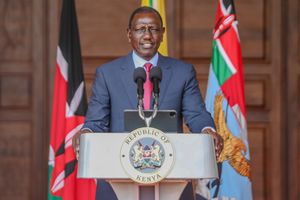Full in-tray for Jumwa at the helm of gender docket

Gender CS Aisha Jumwa before the National Assembly's Committee on Appointments on October 18, 2022.
What you need to know:
- Since the promulgation of the 2010 Constitution, the passing of the two-thirds gender rule has remained a mirage, despite three attempts by Parliament.
- Women had a lot of hope that the August 9 election would help in the realisation of the rule; however, their performance fell short.
Public Service, Gender and Affirmative Action Cabinet Secretary Aisha Jumwa has a full in-tray of gender issues to deal with as she begins her tenure at the ministry.
Ms Jumwa comes into the office at a time when there has been accelerated push for gender equality. Observers say the new minister will be instrumental in coming up with a roadmap on how the country will realise the elusive two-thirds gender rule.
Since the promulgation of the 2010 Constitution, the passing of the two-thirds gender rule has remained a mirage, despite three attempts by Parliament.
Women had a lot of hope that the August 9 election would help in the realisation of the rule. However, their performance fell short. Of the 290 constituencies, only 29 women were elected to Parliament, marking a 30 per cent increase in the number of women elected from single constituencies. Only 23 were elected in 2017.
This means that even with the 47 women representatives and nomination slots set aside for women, the National Assembly, which has 349 members, only has 80 women. One of them, Kandara's Alice Wahome, has since resigned to take up the Water docket in Dr William Ruto's administration.
In the Senate, with a total of 67 members, including the nominated ones, only three women members were elected from the 47 counties. This means it has 21 women members.
Only seven women made it to the Council of Governors out of the 47 counties.
Harmful cultural practices
All eyes will also be on CS Jumwa to show the direction to take in the fight against harmful cultural practices, among them female genital mutilation (FGM) and child marriage, which continue to put millions of girls and women at risk.
The government has already been undertaking a major campaign across the 2022 hotspot counties where FGM and child marriage cases are rampant.
In November 2019, former President Uhuru Kenyatta launched the National Policy on Abandonment of FGM, which heralded the campaign to eradicate the vice by the end of this year. This was followed by a presidential directive that emphasised permanent eradication.
Speaking when she officially took over from Prof Margaret Kobia, Ms Jumwa noted that even though a lot has been achieved over the years in the areas of gender equality, more needs to be done on women empowerment, especially representation in decision-making, breaking the silence on gender-based violence (GBV) and economic transformation.
She enumerated her priorities, saying they will entail women’s economic empowerment, ending GBV and implementing constitutional provisions on the gender rule. The CS did not, however, give much detail on the strategies she will put in place to ensure the gender principle is achieved.
Jumwa also revealed that her ministry will develop an affirmative policy and support the finalisation of the merger of the Affirmative Action Funds into the proposed Biashara Bank. “In implementing this broad mandate, I will be guided by the spirit of the Sustainable Development Goal of 'Leave no one behind' – inclusivity, engagement and partnerships will remain key. As you know, the issues under this ministry are cross-cutting. My ministry will be one of the enablers of this agenda.”
Already on the go
The minister has already hit the ground running. This week, she met with a team from the National Government Affirmative Action Fund (NGAAF) led by its board's Chairperson Florence Kiriinya and Chief Executive Officer Roy Telewa.
The ministry, in a statement, said it held discussions on the review of NGAAF regulations to address existing gaps and, in particular, the vulnerable and affirmative groups. NGAAF is a semi-autonomous government agency in the ministry.
The CS will also be instrumental in coming up with initiatives and programmes aimed at enhancing women economic empowerment and gender equality.
According to the Kenya Women’s Empowerment Index (WEI) conducted in 2020, only 29 per cent of Kenyan women can participate equally and effectively in political, economic, and cultural life. It found that on average, 40 per cent of women in urban areas are empowered, nearly double the rate for their rural counterparts.
The study also found that women in the poorest households have a very limited ability to exercise choice, with only about seven per cent of them likely to be empowered. This is a stark contrast to 53 per cent of women in the richest households. Other socioeconomic factors such as marital status also come into play, with single and married women found to be much more empowered than divorcees and widows.
The index, which was developed by the Kenya National Bureau of Statistics in partnership with the State Department for Gender, UN Women and Unicef, provided the first comprehensive and systematic measure for women and girls' empowerment in Kenya.





